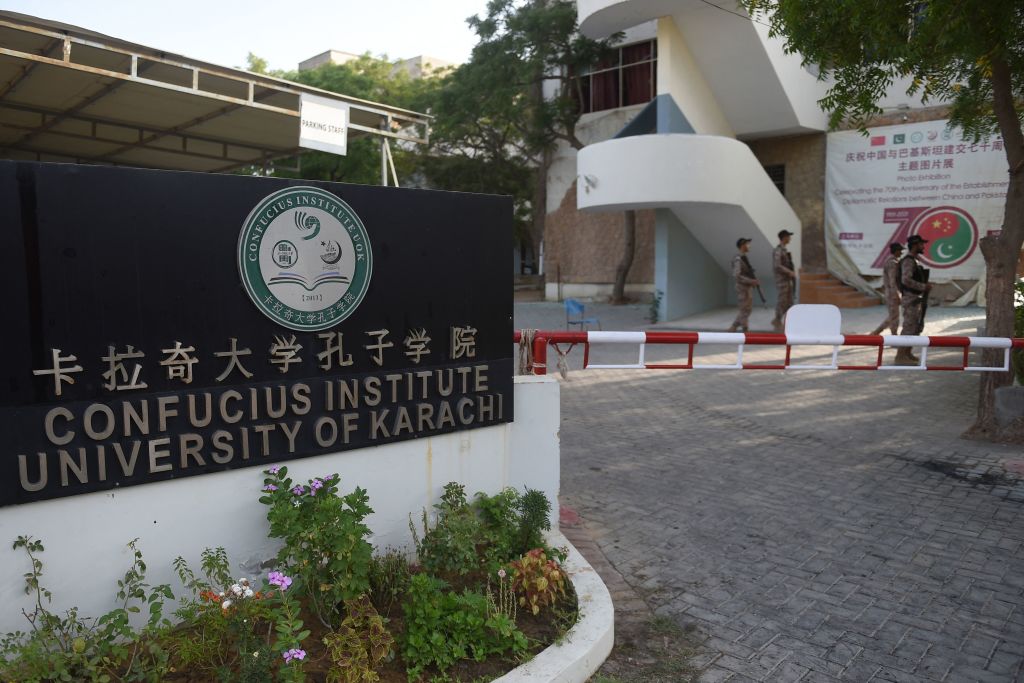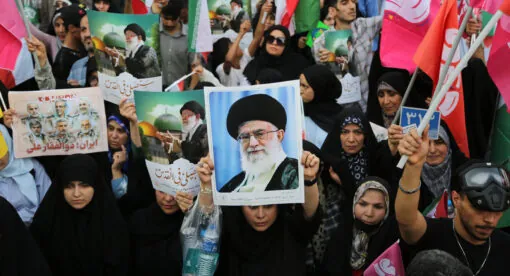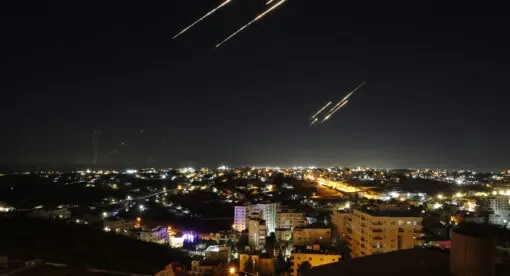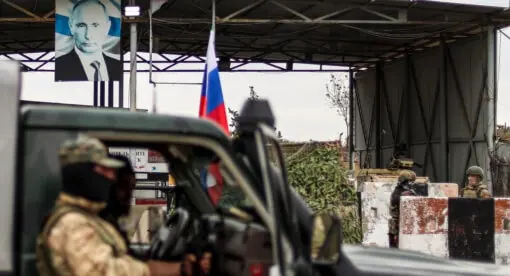Why Are Chinese Nationals in Balochistan? In 2015, China announced a multibillion-dollar China-Pakistan Economic Corridor (CPEC) with the aim of building infrastructure in Pakistan, including in Balochistan’s port city of Gwadar, to connect the country to western China. The total scope of the projects under CPEC has grown to about $65 billion, with most projects focused on electricity and highways. In Balochistan alone, several Chinese companies were awarded contracts to work on dozens of projects related to infrastructure, transport, and electricity.
Pakistan’s civilian government and the military have called CPEC a “game changer,” with political parties across the divide publicly reinforcing the importance of the project. But CPEC has also become a divisive issue, particularly in Pakistan’s periphery. Over half a dozen separatist groups, including the BLA, view CPEC as yet another attempt by Chinese and Pakistani authorities to extract their province’s wealth. The separatist Baloch militants, who had been targeting non-Balochi speaking people and the security agencies for over a decade, in recent years turned their guns toward Chinese nationals working on CPEC projects. One of the first suicide attacks targeting Chinese workers took place in Balochistan’s Dalbandin area in August 2018. At least three Chinese engineers, who were believed to be working at a mineral project, were injured in the attack. The 22-year-old man who carried out the suicide bombing was the son of slain BLA commander Aslam Baloch. In November of the same year, three gunmen tried and failed to storm the Chinese consulate in Karachi in neighboring Sindh province, In a shootout at the front gate, all the attackers were killed after killing two Pakistani policemen and two civilians. The BLA claimed responsibility for the attack.
In June 2020, the BLA once again attempted to carry out a massive attack in Karachi, this time targeting the country’s stock exchange. The two attackers killed three security guards and a police officer but failed to overwhelm security personnel stationed at the building and were killed in a shootout.
These attacks have occurred during general slowdowns in CPEC projects, mainly due to the completion of early harvest projects focused on infrastructure and power plants. The growing economic woes in Pakistan, coupled with rising insecurity, have only added to the challenges facing CPEC.
The Rise of the BLA
The insurgency in Balochistan began decades ago and is rooted in the way the province was incorporated into Pakistan after its independence in 1947. In the early 2000s, the BLA and other separatist groups such as Dr. Allah Nazar Baloch’s Baloch Liberation Front and United Baloch Army operated on the fringes of Pakistan’s diverse militant landscape. They used to target railway tracks and non-Balochi speaking people and were not considered major threats. However, these groups’ capabilities and networks have significantly grown over time as the separatist militants acquired sophisticated weapons and sharpened their skills.
In January and February this year, militants killed at least 17 Pakistani soldiers in attacks on a Pakistani checkpoint in the mountainous Kech district, an area near the country’s border with Iran, and on two separate paramilitary bases in Naushki and Panjgur. Security officials claimed the attacks were planned in Afghanistan, a charge that Taliban officials denied. Pakistani authorities have also accused neighboring India of providing financial and intelligence support to separatist groups, but New Delhi denies the claim.
Given the region’s history, in which numerous countries have used proxies to sow chaos, foreign aid to militant groups cannot be ruled out. For instance, in March 2016, the Pakistani military claimed it had captured an Indian spy identified as Kulbhushan Jadhav in Balochistan who they said was involved in subversive activities in Pakistan.
But while Pakistani officials are quick to point a finger at India, there is another country that they do not openly name: Iran. In off-the-record conversations, Pakistani officials consistently accuse Tehran of not doing enough to secure the border region or to deny safe havens to groups that target Pakistan. Sources close to the separatists also claim they have hideouts in the Pakistan-Iran border region. Pakistan’s Interior Ministry recently confirmed that “anti-Pakistan terror outfits are regrouping in Balochistan via Sistan [Iran’s southwestern province that borders Pakistan and Afghanistan].” Meanwhile, Iran has faced growing threats from ethnic Baloch Sunni insurgents based in Pakistan who have adopted anti-Shiite rhetoric common to many radical Islamist groups based in Pakistan.
Aggressive Security and Deprivation in Balochistan
Shaari Baloch was not someone who fits the stereotype of a suicide bomber. She was an educated woman with a master’s degree in zoology and had worked as a science teacher at a school in her home Kech district. Baloch is not the only atypical attacker; in May 2020, two young men, both students of Islamabad’s Quaid-e-Azam University, were killed in a shootout with security forces in a mountainous area in Balochistan.
One of them, Shahdad Baloch, was once seen on a popular Pakistani TV show, where he asked the then-planning minister some tough questions. “We had Reko Diq, Saindak and Sui Gas, [but] all these projects couldn’t change the fate of Balochistan and its people. How can the CPEC change the fate of Balochistan?” he had asked the minister. “Every government comes and takes something in the name of giving, so my question is would we get anything from the CPEC or not?”
Shahdad Baloch’s question tells the story of Balochistan, the largest by area and Pakistan’s most deprived province. Although successive governments have said the CPEC will change conditions in Pakistan and especially the underdeveloped Balochistan, locals are not seeing improvements in their conditions. Last year, thousands of protesters took to streets in Gwadar and held a sit-in for days. They demanded the right to better education, water, health facilities, jobs, and a decrease in security checkpoints in the province.
“There is no electricity in various areas of Balochistan till today,” said a Baloch student quoted by a Pakistani media outlet. “I can’t speak to my family back home there because they have to climb up the mountains to get mobile network signals. We still use gas cylinders despite having gas fields in the province.” People in several parts of Balochistan claim the security agencies harass them and their men are illegally taken into custody after every terrorist attack. For decades, authorities have chosen to use harsh measures such as enforced disappearances to silence the dissenters. According to the independent Human Rights Commission of Pakistan, at least 1,108 cases of enforced disappearances were reported in Balochistan in 2021. These enforced disappearances remain the biggest tool that the separatist groups use to recruit youths.
“The separatists’ narrative is not very popular among the students,” the student said. “But we are compelled to think in that direction.”
China’s Response to the Attacks in Pakistan
Publicly, Chinese officials have condemned the attacks targeting their nationals in Pakistan, but they have never criticized the Pakistani government or its law enforcement agencies for their failure to stop the attacks. However, recent statements from the Chinese officials suggest that Beijing’s frustration over attacks on its nationals is growing.
“The blood of the Chinese people should not be shed in vain, and those behind this incident will surely pay the price,” said a spokesperson for the Chinese Foreign Ministry after the April 26 suicide bombing inside Karachi University. In a separate statement, the Chinese Foreign Ministry said the country’s assistant foreign minister had a chat with Pakistan’s ambassador to China and that Islamabad was told to “immediately make a thorough investigation of the incident, apprehend and punish the perpetrators.” In an interview in August 2021, Sheikh Rasheed, the interior minister of Pakistan at the time, admitted that China wasn’t happy with Pakistan after a suicide bombing killed 12 people, including nine Chinese workers, in Kohistan, a district in northwestern Khyber-Pakhtunkhwa province. The minister also said that the military was in charge of the security of all Chinese nationals in Pakistan.
Despite an increase in security, the separatist groups continue to target Chinese nationals, creating tensions in the China-Pakistan relationship. Given Pakistan’s growing economic woes, providing increased security or launching a crackdown on these groups will require military and economic assistance. Should this threat continue to grow, Pakistan is likely to seek additional financial and military support from Beijing to conduct military operations against insurgent groups in the region. In addition, Pakistan may also lean on China to press the Afghan Taliban to act against terrorist safe havens in Afghanistan, given that the tempo of attacks targeting Pakistani security forces from Afghanistan has continued to grow in recent months.
Ways to Calm the Situation
The state’s aggressive approach toward dissent has not worked. There is a visible trust deficit between the authorities and local population that needs to be addressed. To do that, civilian officials, especially national politicians, will have to step up and engage Baloch youths to restore their trust in the state institutions. This requires measures to strengthen civilian security agencies, an end to enforced disappearances, and a halt to the Pakistani security establishment’s interference in the province’s political affairs.
Winning over Baloch youths and blocking their recruitment into separatist groups will also require Pakistan’s civilian and military leadership to abandon their decades-old habit of doling out money for projects that only benefit an elite few while extracting resources. Pakistan needs a new strategy – one that empowers regional voices, especially dissenting ones, and seeks to bring them into the country’s mainstream political system. So long as these voices remain on the fringes, resentment will only continue to increase. This ultimately will create further openings for foreign actors to leverage groups for their own gains by fomenting chaos and violence in Pakistan.
Moreover, Pakistan must focus on more localized economic development. An example is Gwadar, where authorities built a lush green cricket stadium in a region where people historically play football. Additionally, Gwadar has limited access to clean drinking water, but the cricket field is regularly watered to keep the grass green. Meanwhile, fishermen in the region have seen little to no investment in upgrading infrastructure that can increase their incomes –something that could also unlock significant export earnings by selling fresh seafood to richer economies in the Gulf.
While the United States has largely distanced itself from Afghanistan since the withdrawal of U.S. forces and the Taliban takeover in August 2021, it is important for the Biden administration to remain engaged with Pakistan on key national security issues. This is crucial not only because stability in Pakistan is important for regional stability but also because the emergence of terrorist safe havens in the region will have international repercussions. The Pakistani Taliban are publicly applauding Baloch militants and are also increasing their recruitment activities targeting citizens in Balochistan. Should the situation worsen, an enabling environment for one category of militants could create space for others, including those with global ambitions. It is for this reason that the Biden administration must continue to engage Pakistan and explore opportunities for collaboration on both security and non-security related issues.
Pakistan’s current playbook for Balochistan is not working, and that failure is creating tensions in the China-Pakistan relationship. The securitized approach to countering violent dissent is only going to increase volatility. Given China’s growing frustration with Pakistan, it is important for the country’s policymakers to chart a more inclusive economic and political path forward. It is equally important for the international community, led by the United States, to remain engaged with Pakistan.
Uzair Younus is Director of the Pakistan Initiative at the Atlantic Council’s South Asia Center. Younus is also manager for engagement and strategy at Dhamiri, an innovation firm helping companies align their business competencies with public good needs. He focuses on Pakistan’s political economy and the impact of terrorism on economic stability and tweets at @UzairYounus.
Roohan Ahmed is a Pakistan-based journalist who covers politics, militancy and human rights abuses. He tweets at @Roohan_Ahmed
The views expressed in this article are those of the authors and not an official policy or position of the New Lines Institute.







